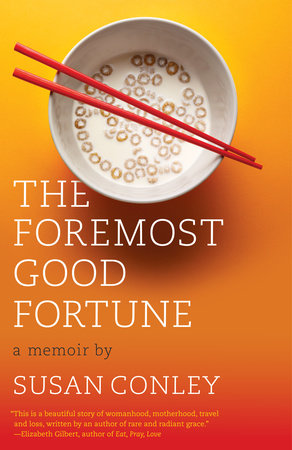The Foremost Good Fortune Reader’s Guide
By Susan Conley


1. What are some of the toughest adjustments for Susan when she first moves to China? Can you compare any scenes from your life with hers, specifically when you faced similar challenges of adjustment or the experience of feeling out of place?
2. How do Thorne and Aidan cope with culture shock in their individual ways?
3. Discuss Susan’s parenting in these volatile first months of China—which decisions of hers would you say are disasters and which are successes?
4. In some moments, Susan listens very intently to what Thorne and Aidan have to say. In other strategic moments, she climbs into “a room in her head,” shutting off her receptors, where she can “still see” her kids but “just can’t hear them” (p. 17). What are, in Susan’s words, her “secret mother superpowers?”
5. Considering the discussions about Battle Hymn of the Tiger Mother, Amy Chua’s memoir about raising her children according to strict Chinese customs, how did Susan react to Chinese parents’ attitude towards their children’s education?
6. Susan made friends with Chinese women. What did she learn from them about being a woman in China these days?
7. How would you characterize Susan’s reaction to getting cancer? What surprised you about her initial reactions? How did Susan’s experience in the Chinese hospital show cultural differences in medical attention? Throughout the book, what other disparities between Chinese and Western opinions about medicine came up? Did this reveal different cultural practices of health?
8. One of the toughest things Susan faced was talking to her children about the cancer. A therapist told her she had one lie about her cancer to her children and from then on, it had to be the truth. What do you think of that advice?
9. Throughout the book, what does Susan seem to learn about parenthood when she talks to her children about cancer and death?
10. In what different ways does disease affect each person in her family: Her husband, Tony. Her children, Aiden and Thorne…..
11. In the chapter called “Spaceship,” Susan and her mother take Thorne and Aidan to the radiation treatment. Afterwards, Susan says, “I’m still not sure if bringing them in was a mistake.” In your opinion and from what you know about the chapter, was it a mistake or not? Would or wouldn’t you have shown the kids that experience of cancer?
12. Does returning to China help Susan gain insight into her experience of cancer, or does it compound her confusion?
13. Susan often uses China, a land of foreignness, as a metaphor for the way cancer feels like a foreign experience. What other specific metaphors for cancer did you notice in the book, and how did these metaphors help Susan make sense of her experience?
14. In the chapter, “Starter Buddha,” Susan and Tony travel to the Beijing flea market to find a talisman that will “ward of the leftover cancer juju.” Does Susan in this chapter exhibit a changing attitude toward cancer? Do you have any meaningful talismans in your life?
15. Compare Susan’s experiences of China before cancer and after cancer. Did Susan’s encounter with cancer and mortality change her approach to life in China?
16. What are some of your favorite comments made by Thorne and Aidan? Pick a few of them and consider how Thorne and Aidan often unintentionally become like zen teachers. What do you learn from them? How does Susan’s representation of her children change the way you view kids in general?
Just for joining you’ll get personalized recommendations on your dashboard daily and features only for members.
Find Out More Join Now Sign In